
The Greatest Love Story Ever Told
JESUSí LAST JOURNEY TO JERUSALEM

The Greatest Love Story Ever Told
JESUSí LAST JOURNEY TO JERUSALEM
Jesus did not stay any longer in the cities, but went with His disciples into Ephraim, which is near the wilderness. Here Jesus stayed until it was time for the Passover Feast. Then Jesus and His disciples started again for Jerusalem.
As they passed through a certain village of Samaria, they saw a company of ten men. Nine of the men were Children of Israel and one was Samaritan. These men did not come very near Jesus and the disciples, because the men were lepers, and they did not want to disobey the law of the country about lepers avoiding people who were not lepers. No one could help feeling pity for the lepers, they were so lonely. Driven from their homes, with no hope of ever being allowed to go back to their friends; suffering with this dreadful disease, which no doctor on earth knew how to cure, they just wandered about.
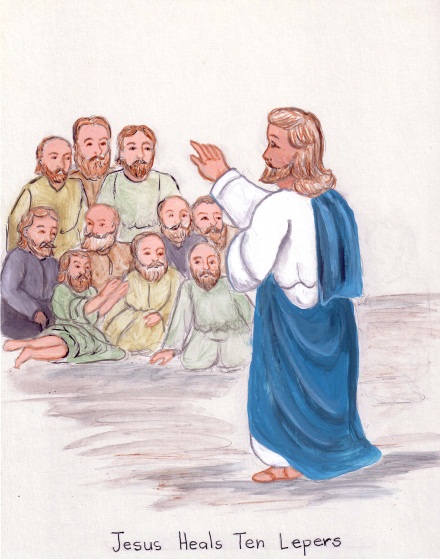
But however much people pitied these lepers, there was only One who was able to help them. Perhaps these lepers had heard that Jesus of Nazareth could heal any trouble, even their dreadful disease; perhaps they had heard that Jesus would pass that way, and perhaps they were looking for Jesus. Now, when they saw Jesus coming, even while He was far away, the lepers began to cry, “Jesus, Master, have pity on us.” Jesus, hearing their cry, said, “Go, show yourselves to the priest.” They obeyed Jesus, and as they walked along each one surely looked at the other, and then each one certainly looked at his own body. What joy. Their skin was no longer dry and white, and full of sores; it looked as it had when they were well. Could it be true that they were no longer lepers? Yes, it was really true; Jesus had made them well.
Now when the Samaritan saw that he was well, he went back to Jesus, and, falling down at His feet, thanked Jesus again and again for making him well. Seeing only this one man, Jesus said, “Were there not ten who were cured? Yet none of them have come back to thank God except this stranger. Where are the nine?”
And where were those nine Children of Israel who had been made well? – Hurrying as fast as they could to show themselves to the priests. They longed to hear the priests say that they were well; they longed to live like other people again. They longed so much to be at home with their friends that in their hurry they forgot to thank Jesus who had made them well. How different their lives would have been if Jesus had not been kind to them. And yet they did not say a word of thanks to Jesus who had made them well. Do we ever forget to thank God for what He does for us?
As Jesus and His disciples traveled toward Jerusalem they were joined by other groups of people who were on their way to the Passover Feast, too; and as they walked together Jesus taught one lesson after another and answered the questions asked of Him. The Pharisees asked when the kingdom of heaven should come, and Jesus told them that this was a kingdom which would never be seen, for it was in the hearts of those who belonged to it.
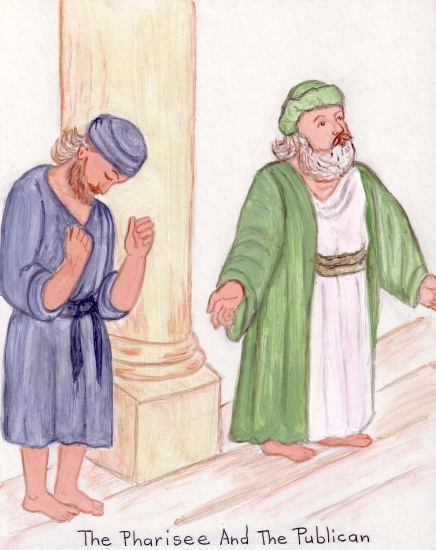
Here is one of the parables Jesus told on this journey: “Two men went into the temple to pray; one was a Pharisee, and the other a publican. The Pharisee stood with his head up and proudly said, ‘God, I thank thee that I am not as wicked as other men are, or even like this poor publican. I go without food twice every week, and I give away a tenth of all that I own.’ But the publican, standing away from the others in the temple, did not even lift up his eyes toward heaven. He put his hands on his chest and said, ‘God be merciful to me, a sinner.’ Jesus said, ‘I tell you that God was better pleased with this man than he was with the other who boasted of his good works.’”
Those who are the greatest in their own eyes are often the least in God’s sight. If we are kind and generous to others because we love them we will not always be thinking how good we are to them.
As the group passed along the road little children were brought to Jesus that He might put His hands on them and bless them. The disciples wanted to send these little children away, for they thought Jesus was too busy to be troubled with children, but Jesus would not allow this to be done.
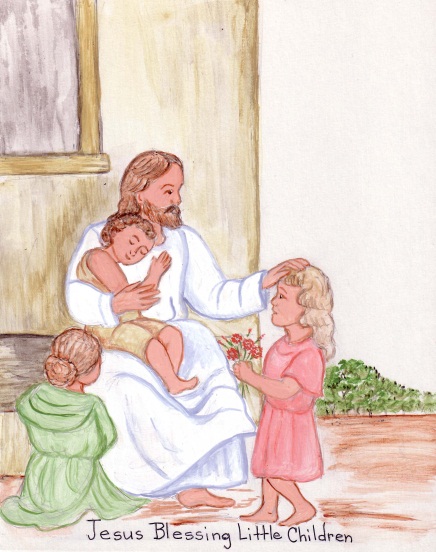
Jesus called the little children to Him, and laying His hands on them, He said those words that so many children have learned since then, and words which every child loves, “Suffer the little children to come unto me, and forbid them not, for of such is the kingdom of heaven.”
Jesus always loved children. Do you remember that time, after Jesus’ disciples had been quarreling about who was to be the greatest man in the new kingdom that they thought Jesus was going to build in their country? Then Jesus took a child in His arms and said that it was only those who were loving and obedient like a child; those who knew they did not know much, and were willing to learn, that would be members of the kingdom, and that wanting to be great was sure to make them the lowest.
When they had gone a little farther on the road, a rich young man came up to Jesus and kneeled at His feet, saying, “Good Master, what shall I do that I may have the life that goes on forever?”
Jesus said to him, “Why do you call me good? There is none good but one, that is God. But if you want to live forever, keep the commandments. You know them. Do not kill. Do not steal. Do not tell things that are not true. Honor your father and mother. Love your neighbor as yourself.”
The young man answered and said to Jesus, “Master, I have kept all these commandments ever since I was a little boy. What more must I do?”
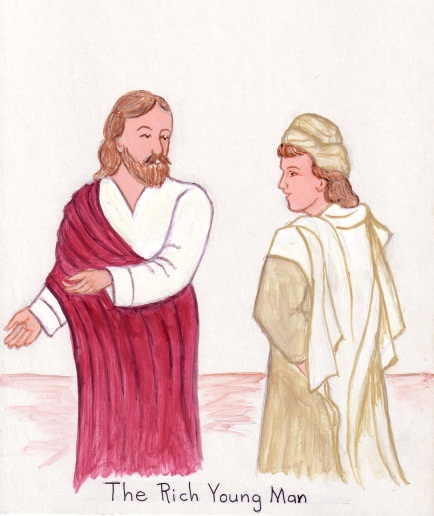
Jesus knew that this was true, and said to the young man, “If you want to be perfect, go and sell all that you have and give it to the poor, and you shall have treasure in heaven. Then come and follow me.”
Now this young man was very rich, and probably cared more for his money than for anything else in the whole world. Jesus knew this, and knew that until the young man was willing to give up everything that was dearer to him than love for God, he could not be a true disciple of Jesus. And so, though Jesus loved the young man, Jesus asked him to do this thing which was so hard for the young man to do. The young man said no more, but went away very sad. The young man felt that he could not do what Jesus had asked of him.
Turning to the other travelers Jesus said, “How hard it is for people to give up their riches and the things that are dear to them to follow me!”
And Jesus showed them that it was only when God gave them new hearts that such a thing was possible.
Peter then spoke for himself and the other disciples, and said, “Lord, we have left all to follow you; what shall we gain by doing it?”
Jesus answered, “There is no man who has left home or parents or friends or wife or children, for my sake, who shall not receive in this world many times as much as he has lost. And in the world to come he will have the life that never ends.”
Then Jesus told them another story: “The kingdom of heaven is like a man who owned a large vineyard; that is, a place where grapes are grown. This man went out very early one morning to find men who would work for him in this vineyard, he found some who agreed to work all day for a Roman penny, which was what such laborers usually earned for a day’s work at that time in history. About nine o’clock in the morning the owner of the vineyard went out again, and seeing others standing in the market-place doing nothing, he said, ‘You can go into my vineyard, and whatever is right I will give you.’ At twelve o’clock and at three o’clock the vineyard owner did the same thing. Even as late as five o’clock in the afternoon he found men in the market-place who were doing nothing. He asked them, ‘Why do you stand here all the day idle?’ They answered him, ‘Because no man has hired us.’ The vineyard owner then told them, as he had the others, that they could work in his vineyard, and that he would pay them what was right. In that country the day was over at sunset, which was usually six o’clock, and at that time their work stopped. So when it was time to stop work that evening, the vineyard owner said to one of his head workers, ‘Call the men in and pay them for what they have done, beginning with those who came last.’ The men who had worked only one hour came in, and each of them received a penny. Those who came to work at three o’clock were called next, and they also got a penny each; and so did every man who had been at work in the vineyard that day. Now, when those who had been at work since early morning heard that every one had been given the same money, they were angry. They thought they should be paid more than those who had only worked a part of the day, and they found fault with the man who hired them. The vineyard owner said, ‘Friends, have I not given you all that I promised you? I have not wronged you, for you agreed to work for a penny a day. Take what belongs to you, and go home. Is it not right for me to do as I wish with my own money? Are you angry because I want to be kind to these other men?’”
In this parable Jesus taught that God will always reward good, honest work; not always according to the amount we have done, but according to our willingness to help. Just as a mother praises her child for trying to help her, even though the child could not do much work, or do it very well.
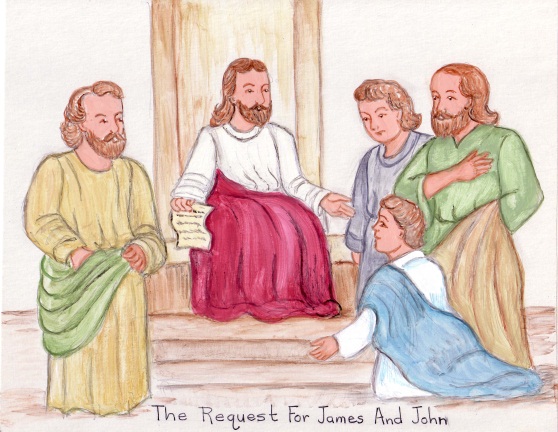
Jesus now took His disciples apart from the others, and as they sat together, resting, Jesus spoke to them once more about what was going to happen to Him. Jesus said, “We are on the way to Jerusalem now and there I shall be given up to the chief priests and scribes, who have said that I should be put to death at once. But on the third day I shall rise again.”
It is strange that the disciples did not understand what Jesus meant, but they did not, and even now, after all the time they had spent listening to Jesus teach, they were still wondering who would have the highest places in the kingdom.
The mother of James and John came to Jesus at this time, and asked that her two sons might have the highest places, those next to Jesus Himself.
The ten other disciples were angry with James and John, when they heard what had been asked of Jesus; for they all wanted the same thing, and they thought Jesus would probably give these places to those who had asked for them first. Perhaps they felt that they would be much more worthy of such high places in the kingdom than James and John. At any rate the other disciples did not think James and John had any more right to the high places in the kingdom than they had.
Again Jesus tried to teach them that the one who would be the greatest must be the least. The greatest must be willing to forget himself and think of others, even as Jesus, who all His life worked for others instead of having others work for Him.
After a short rest Jesus and His disciples started again on their journey. As they came near to Jericho they saw two blind men sitting by the wayside, begging. Though these men could not see what was going on, they could tell by the sound that a great many people were passing.
One of the two blind men, named Bartimaeus, asked what it all meant, and they told him that Jesus of Nazareth was passing by. Bartimaeus knew that name, and knew Jesus had spoken to other blind men and given them sight. So now Bartimaeus called out, “Jesus, son of David, have pity on me.”
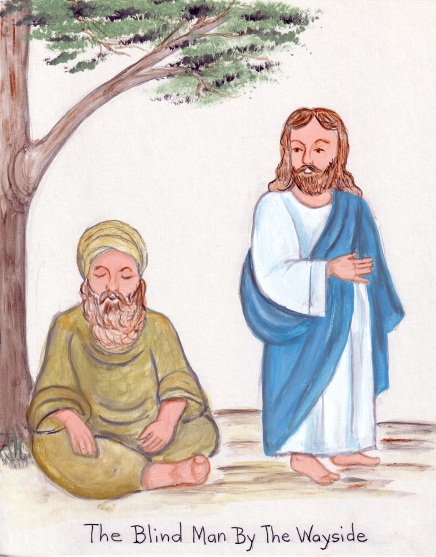
He called so loudly that people tried to quiet him; but he would not be quieted. Jesus stood still and commanded that the blind man should be brought to Him. Willing people called to Bartimaeus, “Be of good cheer; rise, he is calling you.”
Then they led both blind Bartimaeus and his blind friend to Jesus, who said to them, “What do you want me to do for you?”
They answered, “O Lord, we want our eyes opened.”
Jesus touched their eyes and said, “Your belief in me has made you well.”
The blind eyes could see now, and the two men followed Jesus, praising God for what had been done for them. And all the people, when they saw what Jesus did, also praised God.
The travelers, who were now a large company of people, arrived at Jericho. This was a busy city where there was a great deal of buying and selling going on; and as a certain share of the money taken in this way belonged to the Roman government, many publicans lived in the city to collect this money.
One of the most noted of these publicans was a man named Zaccheus. When Zaccheus heard that Jesus was passing through the city he wanted to see Him. Zaccheus was a very short man, and could not see over the heads of people, but he was so anxious to see Jesus, of whom everyone was talking, that Zaccheus ran ahead and climbed a tree on the road along which he knew Jesus must pass.
As Jesus drew near, He looked up and saw Zaccheus in the tree. Jesus said, “Zaccheus, make haste and come down, for I want to stay at your house today.”
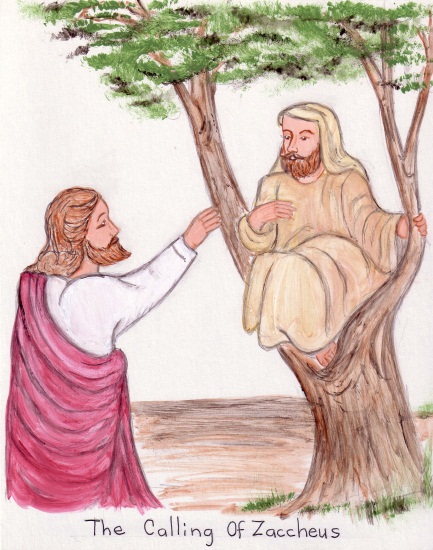
What an honor for Zaccheus. He did not need to be called twice, but came down from the tree as quickly as he could, and with joy welcomed Jesus in his home.
The people didn’t like Jesus going with Zaccheus, and they muttered, “He has gone to be the guest of a man who is a sinner.”
Perhaps Zaccheus was a wicked man; perhaps he had not always been honest; but the loving spirit of his guest, Jesus, made him want to be good and honest, and to begin a different life right away.
So Zaccheus said, loud enough for all to hear, “Lord, half of my goods I will give to the poor, and if I have taken anything from any man dishonestly, I will give him back four times as much as I have taken.”
Jesus said to Zaccheus, “This day is salvation come to this house. I came to earth on purpose to seek and to save that which was lost.”
Jesus knew that a man who was willing to do as much as Zaccheus was willing to do to undo his wrong actions had started in the right direction. Zaccheus was surely a better man after this.
But even though Jesus had done Zaccheus so much good, and had made an honest man of him, the people were displeased to think that Jesus was friendly with a publican. Did Jesus not claim to be their king? Was Jesus not on His way to Jerusalem, where He would set up His throne? That is what they thought and what they hoped would happen.
Knowing their thoughts, Jesus told them this parable: “A certain nobleman went into a far country to receive for himself a kingdom; then, after he had been made king, he expected to return. Before he left home he called his ten servants together and gave to each of them the same amount of money, saying, ‘Make the best use you can of it until I come back.’ Now his people did not like this nobleman, and sent this message to the far country, ‘We will not have this man rule over us.’ No attention was paid to the message. The nobleman received his kingdom and returned. Again he called his servants, to whom he had given the money that he might find out what each one had been doing. The first man came gladly, for he had done his best with the money that had been given him. He passed it to his master, saying, ‘Lord, here is your money, and ten times as much more as you gave me.’ To him the nobleman said, ‘Well done, good and faithful servant. Because you have been faithful over a very little, you shall now be ruler over ten cities.’ The second man, too, was glad to come, for he had done his best. He said, ‘Lord, here is five times as much as you gave me.’ The nobleman praised him also, and said, ‘Well done, you shall be ruler over five cities.’ The next man came unwillingly, for he had done nothing with his master’s money. He hung his head in shame, as he said, ‘Lord, here is your money which I have kept laid away in a napkin. I was afraid of you, for I know how strict you are, and how much you expect every one to do.’ The nobleman said to this man, ‘If you knew that I expected a great deal, why did you not try to make my money earn all it could, so that, when I came back, I could have received all that belonged to me?’ Then he said to those that stood by, ‘Take all that the man has away from him, and give it to the one who has been the most faithful.’”
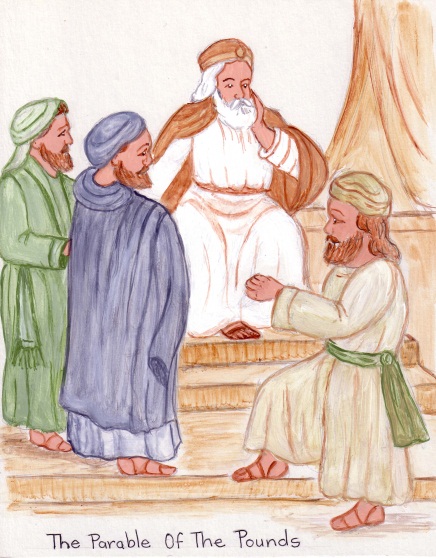
In this parable Jesus Himself is the nobleman, and heaven is the far-away country. Those to whom Jesus was talking were the servants, and so are we, for Jesus has not yet come back from heaven, the far-away country. We must make the best use of everything Jesus has given us if we want to hear these words from Jesus, “Well done, good and faithful servant.”
After the rest at Jericho the travelers were ready to climb the long hill that lay between Jericho and Jerusalem. It took five or six hours to make the trip, and they gave themselves enough time to finish their journey before sunset, for it was Friday, and at sunset the Children of Israel’s Sabbath began.
Bethany was between Jericho and Jerusalem, and when they came to this little village Jesus and His disciples, leaving the rest of the party, went to the home where Jesus was always welcome, the home of Martha and Mary. There Jesus quietly spent His Sabbath day, happy in knowing that He was among friends who loved Him.
The Passover did not begin until the next Thursday at sunset, but many Children of Israel from the country had already arrived in Jerusalem, and were asking each other, “Do you think Jesus will come to the feast?”
They may have been answered by some of those who traveled part of the way with Jesus, who told them that Jesus was now at Bethany.